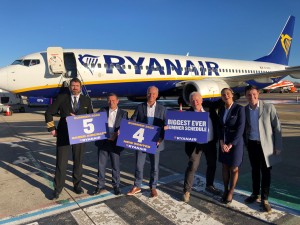Bristol Airport is on course to return to its pre-Covid passenger levels next year after its two biggest low-cost airlines Ryanair and easyJet this week announced they are to base more aircraft there and introduce new destinations.
Ryanair is to increase its Bristol-based fleet from four to five planes next summer, which will allow it to increase its route network from the airport to 33 with four new destinations. 
EasyJet, the airport’s largest operator flying to just under 70 destinations, will bring in one new aircraft to Bristol next summer, taking its total to 17.
This week it announced it will be adding Enfida-Hammamet in Tunisia to its Bristol services next March.
The votes of confidence in Bristol by the UK’s two largest economy airlines have been welcomed by airport bosses, who said they followed similar new agreements with operators such as full-service German flag carrier Lufthansa and national airline Swiss International Air Lines (SWISS), as well as holiday operators Jet2 and Tui.
The airport has enjoyed the fastest recovery from the impact of the pandemic of any in the UK outside of the major international hubs.
For the past seven months since most travel restrictions were lift it has operated at more than 90% of its pre-Covid passenger numbers.
Airport CEO Dave Lees said holiday flights had been particularly busy as families sought to travel to Mediterranean beach resorts, particularly in markets such as Turkey, which were outside the eurozone.
Ryanair CEO Eddie Wilson, who was visiting Bristol Airport to announce the new services to Porto, Marseille, Venice and Bydgoszcz in Poland, said the airline had also recovered from the pandemic quicker than its rivals – which he put down to the fact that it had retained most of its people when it was forced to ground its aircraft.
“We are at a good place in the market right now,” he said. “It is like the recovery from the 2008 financial crash. More families are flying with us because of our reliability and our prices but also people who knew of us before but never travelled with us.
“It’s like shopping in Aldi or Lidl. People used to park around the corner from those supermarkets and sneak in. Now they’re happy to be seen going in as they know most of the time they get good quality at low prices.
“They will never go back to paying twice as much for washing powder again. They try travelling with us and are pleasantly surprised at the new aircraft, our reliability and the cost.”
The addition of the four new routes from Bristol takes Ryanair’s network from the airport to its largest ever. The flights to Venice will land at Marco Polo Airport, which is much closer to the city than service’s previous destination of Treviso, 31km away.
Ryanair’s five-strong Bristol fleet will include two next generation Boeing 737-MAX 8200 aircraft, which have 197 seats – eight more than the usual 737-MAX configuration.
The aircraft, called Gamechangers by Ryanair, also have a 16% lower fuel burn and 40% less noise emissions, than standard 737s.
Mr Wilson said bringing the two new aircraft to Bristol was total investment of $500m.
“They’re great. They’re like the Tesla of the air,” he added. “The addition of a fifth aircraft and our biggest ever schedule for Bristol means we will be offering more than 290 weekly flights on 33 routes.”
Flights to Venice from Bristol will operate four times a week and those to Porto three times a week, The services to Bydgoszcz and Marseille will be twice weekly.
EasyJet’s new Enfida-Hammamet route will operate twice a week from 27 March with flights will departing on Mondays and Fridays all year-round.
A popular tourist hotspot, Hammamet is known for its colourful nightlife, sunny weather and golden beaches.
Half of easyJet’s Bristol fleet includes Airbus’s 186-seat A320neo (new engine option) aircraft, which cut fuel use by 15% and reduce noise and take-off and landing by around 50%.
Bristol Airport is awaiting the result of a High Court appeal by campaigners seeking to overturn the planning approval for its expansion.
The scheme, which was given the green light by a planning inspector earlier this year after North Somerset Council rejected it, would increase the airport’s capacity to handle 12m passengers a year – up from the 10m restriction under its previous planning permission.
It would involve expanding the terminal building and increasing car parking. The airport handled 3,686 flights on its 116 routes last month.
Pictured: Bristol Airport CEO Dave Lees, third from left, and Ryanair CEO Eddie Wilson, fourth from left, join executives and crew to launch the airline's new routes



















